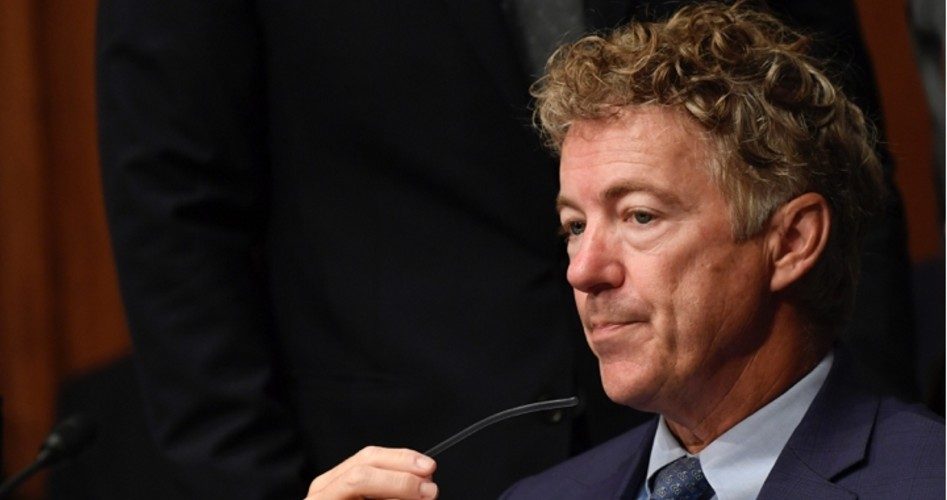
Senator Rand Paul (R-Ky.; shown), in a Friday morning tweet, noted that the ouster of Saddam Hussein “made Iran stronger,” and expressed concern about what a war with Iran could lead to in the long term. He also insisted, “The Constitution dictates that we declare war.”
Paul, son of the strongly non-interventionist Ron Paul, who sought the Republican Party presential nomination in 2008 and 2012, is usually a supporter of President Donald Trump. But in the aftermath of the U.S. assassination of top Iranian General Qasem Soleimani, Senator Paul expressed concern as to what Trump’s actions could lead to. Also killed was Abu Mahdi Muhandis, the leader of the Popular Mobilization Forces (PMF), which attempted the take-over of the U.S. embassy in Baghdad on New Year’s Eve.
Senator Paul said that he knew that Trump “understands that the toppling of Saddam Hussein made Iran stronger.” While both Soleimani and Hussein were both evil men, “the question remains, whether his death will lead to more instability in the Middle East or less.”
“The question today is whether the assassination of Soleimani will expand the war to endanger the lives of every American soldier or diplomat in the Middle East,” Paul added.
Senator Paul also addressed the larger issue of just how far a president can go in taking military action on his own. “If we are to go to war with Iran, the Constitution dictates that we declare war. A war without a Congressional declaration is a recipe for feckless intermittent eruptions of violence with no clear mission for our soldiers. Our young men and women deserve better.”
In support of his position that only Congress has the power to declare war, Paul quoted Senator Henry Clay (also of Kentucky), who lost his son in the Mexican War. “When Henry Clay lost his son in the Mexican-American War in 1847, he spoke to a public gathering in Lexington [Kentucky], which included a young Congressman Abraham Lincoln in the crowd.”
Senator Paul quoted Clay, who said, “A declaration of war is the highest and most awful exercise of sovereignty … such a vast and tremendous power ought not to be confided to the perilous exercise of one single man.”
“Clay’s words still ring true,” Paul said.
Ironically, the young Lincoln, when he was later president, was among many U.S. presidents who have sent American military personnel into war without any declaration of war by Congress. Many other times in U.S. history, presidents have taken military action without any authorization from Congress, much less a formal declaration of war.
In fact, this is not the first time that President Trump himself has ordered military actions against another nation, such as the bombing of Syria earlier in his tenure. A listing of other presidents who have essentially gone to war — on their own volition, without any authorization whatsoever from Congress — is quite long. Perhaps the most egregious (other than Lincoln’s initiation of hostilities against states that seceded in 1860-61, in what became known as the Civil War) was President Harry Truman’s unilateral decision to put America into the Korean War. Of course, Truman said it was only a “police action,” not a war — a “police action” in which nearly 40,000 American military personnel lost their lives.
What did the Framers of the Constitution intend? Alexander Hamilton, who was an advocate of “energy in the executive,” nevertheless said the president was only authorized to repel sudden attacks, but was otherwise not allowed to declare war on his own. James Wilson, another delegate at the Constitutional Convention, assured the Pennsylvania Ratifying Convention: “It [the power to declare war] will not be in the power of a single man.” George Washington, while serving as president, was quite explicit, saying, “The Constitution vests the power of declaring war with Congress; therefore, no offensive expedition of importance can be undertaken until after they have deliberated upon the subject, and authorized such a measure.”
Thomas Jefferson maintained that the “dog of war” should not be in the hands of a single man, even the president. As president, Jefferson deferred to Congress for authority to take offensive action against the Barbary pirates. Why? Jefferson told Congress, “I communicate [to you] all material information on this subject [the acts of piracy by the Barbary states such as Tripoli], that in the exercise of this important function confided by the Constitution to the Legislature exclusively their judgment may form itself on a knowledge and consideration of every circumstance of weight.”
While they may have disagreed on other matters, Jefferson, Hamilton, and Washington all agreed — the power to declare war resides with Congress, not the president.
It is noteworthy that President Trump has been accused of “abuse of power” in making a telephone call to the president of Ukraine, that President Richard Nixon committed an impeachable offense by covering up a burglary of the Democratic National Committee at the Watergate office building, and that President Bill Clinton likewise committed an impeachable offense by lying under oath in a civil proceeding. Without passing judgment in this article on the merits of whether those actions justified impeachment, perhaps Congress and the American people should be more concerned about multiple U.S. presidents routinely usurping the power to go to war, placed in the Congress by the U.S. Constitution.
Photo of Sen. Rand Paul: AP Images
Steve Byas is a university instructor of history and government and the author of History’s Greatest Libels. He may be contacted at [email protected]

